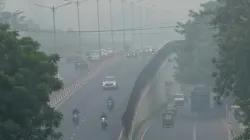Smog shrouds Delhi as air quality remains in 'very poor' category'; schools shift to hybrid mode
Delhi's air quality improves to "very poor" from "severe," prompting schools to adopt a hybrid learning model amid persistent smog and health concerns.

On Tuesday morning, Delhi woke up to a "very poor" air quality index (AQI) but brought slight relief after a week-long period of "severe" air pollution. The Central Pollution Control Board (CPCB) recorded the city's AQI at 382 at 0700 hours under the "very poor" category but much better than the "severe plus" levels last few days.
Smog lingered thickly over the National Capital, blanketing the place that had affected visibility and warnings for vulnerable populations to stay indoors. Even while the air became poisonous, the trains continued to operate lying under a blanket of fog near New Delhi Railway Station.
The AQI scale categorizes air quality into six levels: 0-50 as "Good," 51-100 as "Satisfactory," 101-200 as "Moderate," 201-300 as "Poor," 301-400 as "Very Poor," and 401-500 as "Severe."
Delhi last week saw its air quality drop to the "severe plus" category for almost four-five days in a row, making the authorities swing to emergency actions set under the Graded Response Action Plan.
Schools move to hybrid mode
Under such hazardous levels of pollution, all schools of Delhi have been directed to shift to hybrid classes enabling offline as well as online classes by the Directorate of Education under the Government of Delhi. The directive comes from the Commission for Air Quality Management (CAQM) which mandated the hybrid model for schools across Delhi and the adjoining NCR districts of Gurugram, Faridabad, Ghaziabad and Gautam Buddh Nagar.
The Supreme court also did not lag behind to say that education should not be compromised against environment considerations. According to a ruling received on November 25 in MC Mehta vs. Union of India, the Supreme Court advised authorities to reconsider GRAP restrictions in the light of their influence on education.
Supreme court concerns
The court highlighted several critical issues regarding school closures and online education:
- Many students lack access to online learning facilities or internet-enabled devices.
- A large number of children are deprived of mid-day meals typically provided in schools.
- Homes without air purifiers offer little respite for children compared to classrooms, potentially negating the benefits of staying at home.
Government's response
The Directorate of Education has instructed all schools, including government, government-aided, and private institutions under its jurisdiction, to implement the hybrid learning model immediately. The move aims to balance the need for uninterrupted education with efforts to mitigate health risks posed by the toxic air.
Outlook
While the slight improvement in AQI offers hope, Delhi remains under heavy smog, with pollution control measures and weather patterns playing a pivotal role in further reductions. Public health experts continue to advise against prolonged outdoor activities, especially for children, the elderly, and individuals with respiratory conditions.
Authorities are monitoring the situation closely, with further decisions expected as weather and pollution trends evolve.